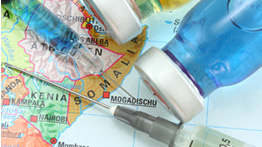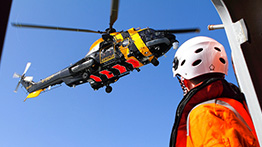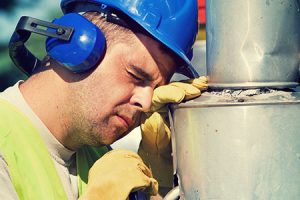Physical and mental health problems amongst seafarers are not uncommon particularly if we consider the type and the difficulties of the work that a seafarer has to face onboard.
When thinking of seafarers’ health and lifestyle one should always have in mind just few of the following factors: unstable work schedules and long working hours due to operational needs, the small community which one should adapt and work with, the feeling of being away from home and familiar faces, the difficult working environment as well as all the hazards that are involved, the restricted medical facilities and limited medical supplies, the confined nature of life on board ship, the climate of the area where the ship is operating.
All the above along with the come and go from home nature of the seafaring profession adds pressure to a person, even if he is not realizing it and is not helping in any way to maintain healthy behaviors like frequent exercise, normal sleep intervals, healthy living environment etc.
Smoking & Drinking
Usually smoking and alcohol consumption rates are higher for seafarers in comparison to workers ashore. This behavior can be related to the fact that a person who works on a ship can feel bored more frequently than a person who works ashore and is able to occupy himself with other tasks that he sees interesting. We must not forget that the things that a seafarer can do when he is not on duty are limited compared to the options ashore. Another very important factor is the stress experienced at sea since tight schedules, hazardous environments, confined spaces etc can be very stressful. Both of the above factors are associated to the tendency of seafarers to smoke and consume alcohol.
Therefore, smoking and drinking is being seen as a way to
- Relieve from stress,
- Increase concentration, although this is a myth since the level of concentration declines with every smoke due to the increased carbon monoxide content in the blood which consequently reduces the oxygen supply to the vital organs of the body including the brain, leading to severe energy sapping lethargy.
- Remain awake during night watches
- Overcome loneliness
Another fact that needs to be mentioned is the social belief that drinking and smoking habits make someone look more manly giving them strength, confidence and boldness.
It is also considered that it helps to mingle with a group of persons. Just imagine yourself being at a party where you are the only one that doesn’t smoke. There are not few people who believe that by smoking and drinking, barriers within a team can be removed and so it is thought to be as an important factor which will lead to effective team work and make a seafarer successful.
Regarding drinking although one would expect that seafarers being ashore would present lower rates of consumption this is not the case. The “Survey of the health, stress and fatigue of Australian Seafarers”, AMSA, 2007, revealed that there were significant differences in drinking habits at sea and ashore. While ashore nearly all personnel reported drinking alcohol, and drinkers consumed a significantly higher number of drinks per week. According to the survey the differences in the consumption of alcohol in the seafarers at sea and ashore may be related to recent maritime industry guidelines for drinking at sea, and the existence of alcohol free or ‘dry’ ships in some sections of the industry (i.e. Offshore Oil and Gas). On the contrary the smoking consumption rates were more or less the same. Although the survey targeted the Australian seafarers it safe to assume that the numbers would be similar to other nationalities, although slight differences could be observed due to cultural factors.
| Smoking |
Sea |
Ashore |
| Smokers (%) |
28.3 |
28.8 |
| Cigarettes per day |
20.2 |
18.1 |
| Drinking |
Sea |
Ashore |
| Drinkers (%) |
52.2 |
90.3 |
| Drinks per week |
11.6 |
14.8 |
|
Smoking & drinking behaviours for maritime personnel at sea & ashore A survey of the health, stress and fatigue of Australian Seafarers (AMSA, 2007) |
||
Sleep
When working at sea, sleep disruption is inevitable due to the 24-hour nature of the job. Seafarers usually complain about the fact that they lack proper sleep which makes them feel tired, more stressful and unable to concentrate. Not getting enough sleep leads to:
- feeling sleepier
- difficulty staying alert
- getting irritable
- slower reactions
- poorer co-ordination
- slower thinking
- getting fixated on part of a problem and losing the big picture
- less creative problem-solving
- lower standard of performance becoming acceptable
- performance becoming increasingly inconsistent.
The reason seafarers usually lack proper sleep is mostly related to the design and the operation of the ship. Imagine how it would be to try and sleep in a factory which operates 24/7.
MCA’s “The Human Element a guide to human behaviour in the shipping industry” suggests some design considerations which are closely related to seafarers fatigue and therefore seafarers sleep:
- Noise: Inevitably a Ship produces high levels of noise. Background noise, from shipboard machinery can be stressful and disrupt sleep. Noise levels of 40 to 50 dBA start to interfere with sleep. 70 dBA significantly disrupts sleep for almost everyone.
- Vibration: Vibrations produced by ship’s machinery as well as ship’s movement is another factor that affects sleep. Imagine how it would be to sleep on a vibrating bed, or if in the middle of your sleep you start feeling that you arm feels like it’s holding an electric drill and you wake up finding that as you were sleeping your body leaned against the vibrating wall of your cabin. A seafarer while being onboard a ship is always in contact in one way or another with a ship’s surface, through which vibration is transmitted and therefore he is subject to the effects of vibration on his body.
- Climate: By the term Climate we are refereeing to the temperature, ventilation and air quality of the ship. Getting too got might awake someone in middle of his sleep, just remember how it is to try to sleep on a hot summer day having your bed sheets sticking on you. On the other hand getting too makes the human body to tremble as it tries to produce heat through muscle movement.
- Ship motion: Sleep can be easily disrupted through the pitching and rolling motions of a ship. It is as if someone is trying to knock you off your bed, eventually you will sleep but after some time has passed trying to get the best spot on your bed.
Stress
Most seafarers are exposed to ongoing elevated stress levels something which has a negative impact on physical and mental health not to mention that it can lower work performance. Of course depending on the duties that have been assigned to someone there might be variations of stress levels due to the type and nature of the work. One of the major sources of stress is the overlap between home and work. Stress is usually produced when the people have to cope with demands which exceed their ability to meet them.
Stress can be caused by work-related factors or it may have to do with the private lives of the seafarer (being away from home etc). According to Parker et al (1997), Thomas et al (2005, 2006), Sutherland et al (1989) the factors presented below more or less affect the seafarers:
- Watch patterns
- Work overload, which can also lead to Chronic Responsibility Syndrome
- Tasks that are made unnecessarily difficult mainly because of the work environment (noise, vibration, confined space etc) that the seafarer has to face onboard
- Health worries about contact with dangerous cargos and materials
- Adverse weather
- Employment worries about changes to the industry
- Social isolation and loneliness mainly attributed to the difficult communication between crews of mixed cultures
- Loss of contact with friends and family
- Home leave worries
The problem about stress is that it tends to add up along with other problems that a person may have, for example a physical injury combined with being stressed from work will most probably result to either prolong the recovery of the injury or make it worse.
Nutrition
Nutrition plays a very important role in a seafarer’s health, mostly because of the demanding work environment of the ship in terms of physical condition. Many seafarers although they are less positive about the importance of nutrition to people’s lives still they are explorative with food according to AMSA‘s survey of the health, stress and fatigue of Australian Seafarers.
Chronic diseases may develop as consequence of bad nutritional habits. Being overweight is one of them and it can lead to hypertension, type 2 diabetes, coronary heart disease, stroke, gallbladder disease, osteoarthritis, respiratory problems, sleep apnoea and endometrial, breast, prostate and colon cancer.
Such diseases can be attributed to the fact that nowadays activities at work may be less physical. This is also applies for work onboard ships. Factors that can increase the risk of developing chronic diseases due to nutrition are:
- Sedentary lifestyles, particularly sedentary occupations and inactive recreational activities such as watching television
- Large portion sizes
- A high intake of drinks containing added sugars
The excessive consumption onboard ships of highly processed food, sugar, salt, saturated fats etc can best describe the nutritional habits for a number of seafarers nowadays. On the other hand consumption of fish, vegetables, and fruit proves to be particularly insufficient although such food is being provided onboard ships.
Stress and a lack of physical activity are usually accompanied by an unhealthy diet leading to obesity. Being overweight is a risk factor not only for the development of health diseases, but also for the safety of the work being conducted onboard. For example it is not easy for an overweight person to move across confined spaces or in the engine room where high temperatures usually develop due to machinery operation. Not mention of course that being overweight may also significantly worsen the quality of life.
Drug Use
The long periods of being cut off from the social life and the entertainments ashore in conjunction with the “isolated” environment of the ship, creates for many seafarers the strong desire to party once they are ashore. Such behaviors make the seafarers “attractive” in being approached by drug dealers. In addition the loneliness of the seafaring profession along with the being away from home nature of the job may have adverse effects on the psychology of a person who in order to cope with his feelings he sees drugs as a solution to pass his time until he is ashore once again.
A drug addict’s behavior is closely related to the type of drug used as well as the time that the drug user took his last dose. A main characteristic on the behavior of a drug addict is his tendency in telling lies about his habits and of course to keep it only to himself. The drug user generally develops an ability to lie about his habit and keeps it secret. Crew members may not notice a drug user amongst their colleagues. Moreover, in an isolated community such the one that is found onboard a ship, the crew bonds may be very strong and it could be difficult to believe that a partner is on drugs.
The following behaviors are usually related to drug addicts although the serve mainly as indicators that something more could be hidden behind someone’s attitude
- Sudden unexplained mood changes
- Unusual irritability and aggression
- Tendency to become confused
- Abnormal changes in concentration
- Poor job performance
- Poor timekeeping
- Loss of short term memory
- Loss of interest in job
- Deterioration of relationships with fellow crew
- Dishonesty and theft from boat or fellow crew
- Unexplained changes in financial circumstances
Drug use is a serious problem for every person and needs to be addressed with utmost care.
All the above factors that affect different aspects of a seafarer’s health and lifestyle should be taken into consideration in order to try and understand the reasons why such behaviors rise and how these can be altered.
April 22, 2012 by



